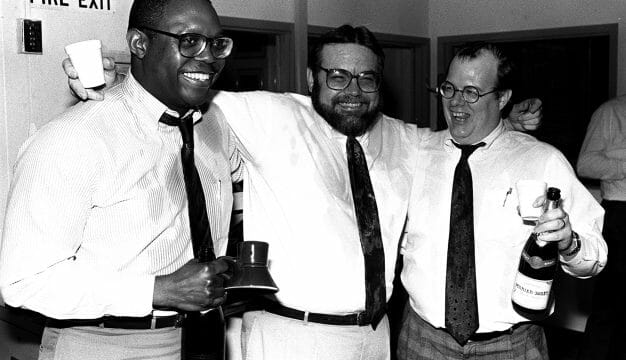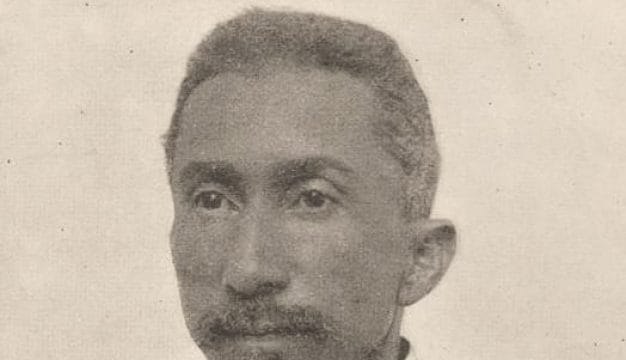Gary Palmer
Republican Gary James Palmer (1954- ) was first elected in 2014 to represent Alabama's Sixth Congressional District in the U.S. House of Representatives. Palmer entered politics after establishing and overseeing an organization to promote conservative views in Alabama. It would evolve to become the Alabama Policy Institute, which he presided over for nearly 25 years.
 Gary Palmer
Palmer was born on May 14, 1954, in Haleyville, located in Winston and Marion Counties, to J. C. and Mae Palmer. He was one of four children and grew up in humble circumstances. His father was a logger without a high school education and his mother went to nursing school when Palmer was in college and worked as a nurse after completing her degree. He grew up in Hackleburg, Marion County, was educated in the local schools there, and graduated from Hackleburg High School in 1972. He then attended Northwest Alabama Junior College in Phil Campbell, Franklin County, (present-day Bevill State Community College) for several years and graduated from the University of Alabama with a degree in operations management in 1977. While at UA, Palmer played junior varsity (JV) football. (Alabama fielded a JV team from 1972 to 1981, according to a university account.) After graduation, he studied in a seminary and then worked in the business sector for some 12 years, mostly in engineering positions. He married Ann Cushing Palmer on November 19, 1983, and together they would have three children.
Gary Palmer
Palmer was born on May 14, 1954, in Haleyville, located in Winston and Marion Counties, to J. C. and Mae Palmer. He was one of four children and grew up in humble circumstances. His father was a logger without a high school education and his mother went to nursing school when Palmer was in college and worked as a nurse after completing her degree. He grew up in Hackleburg, Marion County, was educated in the local schools there, and graduated from Hackleburg High School in 1972. He then attended Northwest Alabama Junior College in Phil Campbell, Franklin County, (present-day Bevill State Community College) for several years and graduated from the University of Alabama with a degree in operations management in 1977. While at UA, Palmer played junior varsity (JV) football. (Alabama fielded a JV team from 1972 to 1981, according to a university account.) After graduation, he studied in a seminary and then worked in the business sector for some 12 years, mostly in engineering positions. He married Ann Cushing Palmer on November 19, 1983, and together they would have three children.
In the late 1980s, Palmer co-founded the Alabama Family Alliance, along with fellow conservative and future Alabama Supreme Court chief justice Tom Parker. The organization aimed to provide a voice for conservatives in the state and to promote conservative policies. It later became the Alabama Policy Institute, with Palmer at the helm for some 24 years, stepping down to run for Congress in 2014. Based in Birmingham, Jefferson County, it advocates for free market principles, limited government, and conservative cultural views. Palmer was also a founding member of the present-day State Policy Network, an organization that connects similar state-based think tanks throughout the United States. Prior to Congress, Palmer served on governor-appointed commissions under Governors Forrest "Fob" James, Robert "Bob" Riley, and Robert Bentley.
A newcomer to electoral politics, Palmer was elected in 2014 to the 114th Congress. The Sixth District seat was left open by the retirement of Spencer Bacchus, who held the position for 22 years. The district covers large parts of central Alabama, encompassing all or parts of Bibb, Chilton, and Coosa Counties in the south, Jefferson and Shelby Counties in the middle, and Blount County in the north. It is a conservative district that has supported the Republican candidate for president by very large margins for at least several decades. In 2014, Palmer defeated Paul DeMarco, an attorney and member of the Alabama House of Representatives, in the Republican runoff and easily defeated the Democratic candidate in the general election. Palmer voiced approval for abolishing the Patient Protection and Affordable Care Act, otherwise known as the "ACA" and "Obamacare," implementing a flat tax or consumption tax, expanding domestic energy production as a means to increase employment, stimulate the economy, and reduce the federal deficit, and limiting the authority of the Environmental Protection Agency and the federal government in general. He has supported term limits (three terms for representatives) and handily won reelection in 2016, 2018, and for a fourth term, running unopposed in 2020.
In one of his first votes in Congress, Palmer joined with his Republican colleagues from Alabama to support repealing the ACA in January 2015 and he later supported a Republican replacement measure. Labeled the American Health Care Act of 2017, it would have eliminated mandates and tax credits and was criticized for proposing the removal of 23 million people from insurance as a means to decrease the deficit by $119 billion over ten years. It failed in the Senate. He has often characterized the ACA as federal overreach and a failure. Palmer has since continued to be a staunch conservative Republican who discounts the science of climate change, opposes women's reproductive rights, citizenship for illegal immigrants, and gun-ownership restrictions, and promotes environmental deregulation and increased fossil fuel production. Of Pres. Donald Trump's main legislative achievements, Palmer supported the contentious 2017 Tax Cuts and Jobs Act, despite credible forecasts that it would add more than $2 trillion to the national deficit over 10 years. He voted against the 2018 First Steps Act criminal justice reform bill, though most Republicans were in favor, and for the 2020 United States—Mexico—Canada Agreement (USMCA), which supersedes the North American Free Trade Agreement. Palmer, like the vast majority of Congress, approved several laws enacted in the spring of 2020 to combat the economic and health crises caused by the Covid-19 pandemic. He later proposed a measure to prevent the misuse of funds and another to provide flexibility in how states spend some of the funds distributed under those measures.
Palmer has served on the Committee on Transportation and Infrastructure and several of its various subcommittees, the Oversight and Government Reform Committee and chaired its Intergovernmental Affairs Subcommittee, the Budget Committee, and the Committee on Science, Space and Technology. He has also chaired the prominent Republican Policy Committee that produces briefs for House Republicans. Palmer joined the House Freedom Caucus, a group of ultra-conservative House Republicans that has been known for ardently defending Pres. Trump during the Special Counsel investigation into Russian involvement in the 2016 presidential election and later during the first impeachment proceedings against Trump in the House of Representatives. Palmer was part of the group, including Alabama representatives Morris "Mo" Brooks and Bradley Byrne, that stormed into a secure meeting room to protest a closed-door House Intelligence Committee hearing during that impeachment investigation.
Indeed, a great deal of his political outlook and rhetoric has mirrored that of Pres. Trump. In the weeks after the 2020 president election, Palmer continued to deny that the Democratic candidate, former vice president Joe Biden, had fairly won the contest. He claimed there was widespread voter fraud despite numerous courts finding no such evidence. He also supported a failed lawsuit, along with the state of Alabama and other Republican lawmakers in the state, brought by Texas before the U.S. Supreme Court to block electoral votes from Georgia, Michigan, Pennsylvania, and Wisconsin. He also voted against the second impeachment of Pres. Trump (for inciting the January 6 attack on the Capitol), although he publicly held Trump responsible for instigating the attack. His tenure has occurred during a time of congressional gridlock, with Republicans opposing much of the agenda of Pres. Barack Obama during the 115th Congress and Democrats opposing much of Pres. Trump's agenda in the 116th Congress.
Palmer lives in Hoover, located in Jefferson and Shelby Counties.



